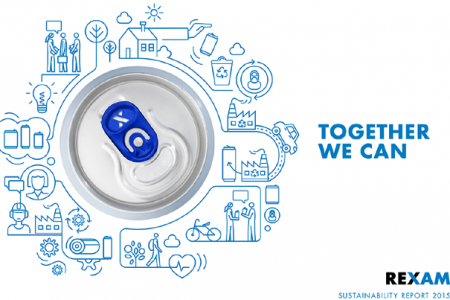study
Study into ‘permanent materials’
According to a study conducted by Swiss consultancy firm Carbotech AG in collaboration with the University of Applied Science Northwestern Switzerland (FHNW), aluminium and steel fulfil the criteria for ‘permanent materials’. The study claims that the current approach of classifying materials as renewable or non-renewable is insufficient for the development of good practices in sustainable […]
The Triumph of Slim
Slim Cans are gaining ground in the beverage can market. The Ball Corporation tells us more about this important size variation.
EFSA evaluation on BPA health risks
The European Food Safety Authority (EFSA) has conducted a re-evaluation of bisphenol A (BPA) exposure and toxicity and has found that at current exposure levels the chemical compound poses no health risk to consumers of any age group (including unborn children, infants and adolescents). It concluded that exposure from the diet or from a combination […]
Alu cans still top sustainable choice
Aluminium cans are the most recycled and recyclable beverage container on the market and they are becoming even more sustainable according to a report by environmental research firm PE International. The report updates a prior life cycle assessment study released in 2010, and shows that an aluminium can made in the US and Canada today: […]
BPA may increase blood pressure study finds
A Korean study, recently published in the American Heart Association Journal, has claimed that drinking beverages from cans increases blood pressure due to the BPA content. The study was conducted by way of a randomised crossover trial with non-institutionalised adults, who were aged 60 years and over, and recruited from a local community centre. ‘A […]
Sustainability in Brazil
Eliana Monteiro, integrated management systems and industrial processes manager at Crown Embalagens Metálicas da Amazônia SA, reports on sustainability in the Brazilian market place.
Fish canning
Richard Piper spoke with Jon Walsh, marketing director at John West, about the fish canning industry and the role packaging plays.
Aluminium industry calls for robust measures
The aluminium industry has called on EU policy makers to build on the European Council’s conclusions by developing robust measures to prevent further investment leakage. Gerd Götz, director general of the EAA, says, “We greatly appreciate that EU Member States are focusing on restoring industrial competitiveness and securing competitive energy costs, but we deplore the […]
FDA research may support BPA safety
The North American Metal Packaging Alliance (NAMPA) has reported that there is significant new evidence to support the safety of the chemical bisphenol A (BPA). The new peer reviewed study, conducted by regulatory scientists at the US Food and Drug Administration (FDA), was accepted for March publication in the journal Toxicological Sciences. The study also […]
Swedish researchers confirm no BPA found in human blood
North American Metal Packaging Alliance (NAMPA) points to findings as further evidence supports international regulatory conclusions that risk from BPA exposure is low. A new study published in Environment International by researchers in Sweden confirms previous reports that bisphenol A (BPA) in human blood is below the levels that can be detected. In addition to confirming […]
Alkaline advances
Frank McDonough and Jim Vandenberg of Quaker Chemical Corporation explore the benefits of using advanced alkaline cleaning technology for aluminium beverage cans
Aluminium industry hit by EU regulatory costs
Cost pressure of EU policies and regulations has put the European aluminium industry at a competitive disadvantage to its global rivals. This is the key finding of a study undertaken for the European Commission in the framework of its Fitness Check on the aluminium sector. The Centre for European Policy Studies (CEPS) has performed an […]
ABA criticises move to ‘discourage’ sugary drinks
A recent study has claimed doctors should ‘discourage’ parents from giving children aged two to five sugary drinks. The study, which was published in the journal Pediatrics, reported that when social and environmental factors were taken into account drinking sugary soft drinks made kids fatter. Its report, entitled Sugar-Sweetened Beverages and Weight Gain in 2- […]
BPA exposure could make girls fat
A new study claims BisphenolA (BPA) could make girls fat. According to research BPA has the potential to impact on the metabolic processes and therefore increases the risk of obesity. Human exposure to BPA is mostly through food sources from packaging and mainly the epoxy lining of metal food and beverage cans. The study, published […]














